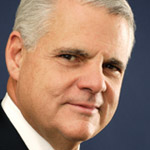 Joe Tucci
Joe Tucci
We believe the hybrid cloud is the answer.
This is a good time to be in the data storage industry, said Joe Tucci, chairman and CEO of EMC.
Tucci was speaking about the explosive growth of data at the company’s annual event, EMC World, which recently took place in Las Vegas.
“We’re being deluged in data,” he said. According to an IDC study about the digital universe, Tucci said last year, the size of the digital universe grew to 1.2 zetabytes. “By the end of this decade, by the end of 2020, there will be 35 zetabytes of data,” he said, adding that 90% of information being created is unstructured.
The authors of the study believe server volumes this decade will increase 1 000-fold. “While all of this is happening, we will only increase IT staff by 47%.”
Tucci noted that this has its pros and cons. Storage is a good industry to be in, “because between now and 2020, there’s going to be a lot more opportunity. On the other side, this is unprecedented productivity.”
The amount of information to manage and from which to extract value is going to grow much faster than IT staff.
This data deluge was one of three pain points Tucci discovered in his meetings with clients and partners, he explained. The other two are IT security, and budget issues.
Regarding the budget, Tucci said: “IT organisations are not dissatisfied with the amount of money they’re spending on IT. What they are dissatisfied about is the fact that almost three quarters of that budget, 73% on average, goes to maintaining existing legacy systems. Only 23% is spent helping propel the company or organisation to be more competitive, more intimate with its customers, get competitive advantage, help save costs and become more efficient.”
As for security, Tucci said this is the number one issue on board members’ minds when it comes to IT. “In 2010, 88% of Fortune 500 companies had botnet activity. Sixty percent of Fortune 500 companies had e-mail addresses compromised by malware. In 2010, there were 60 million variants of malware. To show you the acceleration of that, one third of that 60 million – 20 million – was created in 2010. This problem is accelerating. So, security is a major issue.”
Tucci said cloud computing addresses all three of these issues. “We actually think the answer to these three pain points is greater agility, more choice, more control, unparalleled levels of efficiency, and we believe the hybrid cloud is the answer.”
Products unveiled
The theme of last year’s EMC World was the journey to the private cloud. This year, said Tucci, the conference dealt with cloud computing and big data.
According to Pat Gelsinger, president and COO, EMC information infrastructure products, big data is multi-petabyte data from multiple data sources, with scale out infrastructure and real-time results.
Several products were introduced at EMC World that dealt with big data. EMC’s Greenplum, the company’s data computing products division, led by co-founders Scott Yara and Luke Lonergan, revealed an Apache Hadoop distribution for big data analytics.
Hadoop is open source software for data-intensive processing. The EMC Hadoop product is called the EMC Greenplum HD Enterprise Edition, which marries the Greenplum database with Hadoop’s processing capabilities of structured and unstructured information. The product is expected to be available in the third quarter of this year.
EMC also introduced the Isilon 108NL scale-out NAS hardware product. This product uses three-terabyte Hitachi drives in a 4U node to scale out more than 15 petabytes in a single file system and single volume.
At the conference, EMC also previewed its “Project Lightning”. Gelsinger explained this is a PCIe/flash-based server cache technology that will move data closer to the processor. Project Lightning marks EMC’s entry into the server flash business, said Gelsinger. EMC plans to design, test and qualify MLC-based SSDs for enterprise-class applications and incorporate them into EMC systems later this year.
EMC’s Atmos 2.0 was also revealed at the event. This is the next generation of the company’s cloud storage platform. EMC said this is five times faster and 65% more efficient.
EMC’s VPLEX Geo was also introduced as another virtual storage offering. VPLEX Geo allows storage systems from disparate sources and geographic locations to be federated and used as a single pool of virtualised storage. The VPLEX product introduced last year was able to aggregate resources less than 100km apart. The Geo product goes further, and allows data to be moved non-disruptively over thousand of kilometres.
|
Post a comment
|
Login.
All rights reserved © Copyright by ITWeb, 2011


